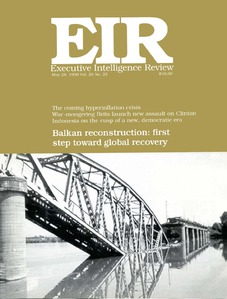Interviews
Ernesto Julio De Simone
Mr. De Simone is president of the Argentine Federation of Agrarian Cooperatives in the northeastern province of Corrientes, and a member of the executive committee of the Agricultural Intercooperative Confederation, Ltd., which represents 200,000 farmers.
Mahendra Siregar
Hon. Mahendra Siregar is the First Secretary in charge of the Press and Information Division of the Embassy of the Republic of Indonesia, in Washington, D.C.
Paul Long
Mr. Long, Vice President of Public Policy for the Michigan Catholic Conference, speaks out against use of the death penalty.
Departments
Africa Report
by Linda de Hoyos
In about-face, Museveni offers amnesty.
Editorial
The biggest U.S.-British rift since Suez?
Economics
U.S. mortality: Economic ‘boom’ is killing the children
by Marcia Merry Baker, John Hoefle, and Linda Everett
While you still hear rave reports of the nine-year “boom” in the U.S. economy, the patterns of death and illness among children over the past years show that the boom talk is a cynical fraud.
Yeltsin halts Russian economic upswing
by Stanislav Menshikov
A commentary by Prof. Stanislav Menshikov. Plus, coverage of EIR’s Bonn seminar in the Russian press.
Moscow paper covers EIR Bonn seminar
Argentine farm leader blasts IMF austerity, backs New Bretton Woods
An interview with Ernesto Julio De Simone.
The coming hyperinflation crisis
by William Engdahl
What will it mean for you? William Engdahl examines Weimar Germany, when a wheel-barrow full of money couldn’t buy a loaf of bread.
Business Briefs
Feature
Reconstruct the Balkans—and the world!
by Lothar Komp
The various proposals for a “Balkan Marshall Plan” are laudable, but they all miss one decisive point. They are all based on the illusion that what is at stake is a local or regional emergency, while the rest of the world is assumed to be basking in economic stability, with the storms on the international financial markets supposedly brought under control. The reality is starkly different.
Destruction in Balkans greater than admitted
by Elke Fimmen
Some sources estimate that Yugoslavia would have to spend 7-10 years of its entire GNP to repair the damage done by NATO bombing. The economic disaster extends to the whole Balkan region, and other countries that rely on the Danube River for shipping.
International
Israeli elections: Barak wins landslide for peace
by Dean Andromidas
The defeat of Benjamin Netanyahu represents a window of opportunity for restarting the Middle East peace process—if the proper change in approach for the economic development of the region is undertaken.
Documentation: A 1994 speech by Lyndon LaRouche in which he laid out his concept of an “Oasis Plan” for Mideast development; a chronology of LaRouche’s interventions in the Mideast; excerpts from the Oslo Accord’s sections dealing with economic development.
New evidence shows British were behind China Embassy bombing
by Jeffrey Steinberg
Washington, Bonn, Rome, Moscow pursue diplomacy
by Rainer Apel
Many worldwide believe bombing was deliberate
Schröder vs. BBC over Balkan ground war
International Intelligence
National
War-mongering Brits launch new assault on Clinton
by Edward Spannaus
While the U.S. news media portray the British-U.S. split, if at all, in the mildest of terms, the British press has been frothing at the mouth over President Clinton’s refusal to back the British campaign to introduce ground troops into Yugoslavia.
Documentation: Excerpts from commentaries by British historians Richard Gott and Alistar Horne.
The British espionage citadel in Washington
by Scott Thompson
Daily, some 400 personnel fan out from the British Embassy, to spy on the United States.
Voters look to dump Gore, and the Democratic Party should listen
by Michele Steinberg
Democrats will fail to regain the U.S. Congress, and will fail to win the Presidency, if they continue to stick to the so-called “Gore legacy.”
Chinese spying scare under growing attack
by Marsha Freeman
Charges that China has been spying on the United States have centered around a scientist who was working for—the FBI.
Michigan defeats proposal to bring back the death penalty
An interview with Paul Long.
Documentation: Testimony against Michigan House Joint Resolution H, and excerpts from an American Bar Association resolution which seeks a moratorium on use of the death penalty.
Congressional Closeup
by Carl Osgood



